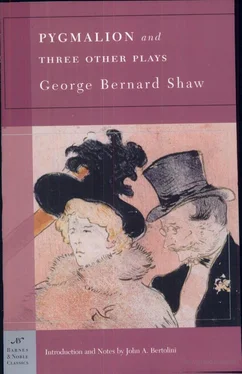THOSE WHO DO NOT KNOW HOW TO LIVE MUST MAKE A MERIT OF DYING
Heartbreak House was far too lazy and shallow to extricate itself from this palace of evil enchantment. It rhapsodized about love; but it believed in cruelty. It was afraid of the cruel people; and it saw that cruelty was at least effective. Cruelty did things that made money, whereas Love did nothing but prove the soundness of Larochefoucauld’s saying that very few people would fall in love if they had never read about it. Heartbreak House, in short, did not know how to live, at which point all that was left to it was the boast that at least it knew how to die: a melancholy accomplishment which the outbreak of war presently gave it practically unlimited opportunities of displaying. Thus were the firstborn of Heartbreak House smitten; and the young, the innocent, the hopeful expiated the folly and worthlessness of their elders.
Only those who have lived through a first-rate war, not in the field, but at home, and kept their heads, can possibly understand the bitterness of Shakespeare and Swift, who both went through this experience. The horror of Peer Gynt [246] Eponymous hero of Henrik Ibsen’s Faustian verse drama of 1867.
in the madhouse, when the lunatics, exalted by illusions of splendid talent and visions of a dawning millennium, crowned him as their emperor, was tame in comparison. I do not know whether anyone really kept his head completely except those who had to keep it because they had to conduct the war at first hand. I should not have kept my own (as far as I did keep it) if I had not at once understood that as a scribe and speaker I too was under the most serious public obligation to keep my grip on realities; but this did not save me from a considerable degree of hyperaesthesia. [247] Abnormal physical or emotional sensitivity.
There were of course some happy people to whom the war meant nothing: all political and general matters lying outside their little circle of interest. But the ordinary war-conscious civilian went mad, the main symptom being a conviction that the whole order of nature had been reversed. All foods, he felt, must now be adulterated. All schools must be closed. No advertisements must be sent to the newspapers, of which new editions must appear and be bought up every ten minutes. Travelling must be stopped, or, that being impossible, greatly hindered. All pretences about fine art and culture and the like must be flung off as an intolerable affectation; and the picture galleries and museums and schools at once occupied by war workers. The British Museum itself was saved only by a hair’s breadth. The sincerity of all this, and of much more which would not be believed if I chronicled it, may be established by one conclusive instance of the general craziness. Men were seized with the illusion that they could win the war by giving away money. And they not only subscribed millions to Funds of all sorts with no discoverable object, and to ridiculous voluntary organizations for doing what was plainly the business of the civil and military authorities, but actually handed out money to any thief in the street who had the presence of mind to pretend that he (or she) was “collecting” it for the annihilation of the enemy. Swindlers were emboldened to take offices; label themselves Anti-Enemy Leagues; and simply pocket the money that was heaped on them. Attractively dressed young women found that they had nothing to do but parade the streets, collecting-box in hand, and live gloriously on the profits. Many months elapsed before, as a first sign of returning sanity, the police swept an Anti-Enemy secretary into prison pour encourager les autres, [248] As a warning to others; literally, “to encourage others” (French).
and the passionate penny collecting of the Flag Days was brought under some sort of regulation.
The demoralization did not spare the Law Courts. Soldiers were acquitted, even on fully proved indictments for wilful murder, until at last the judges and magistrates had to announce that what was called the Unwritten Law, which meant simply that a soldier could do what he liked with impunity in civil life, was not the law of the land, and that a Victoria Cross did not carry with it a perpetual plenary indulgence. Unfortunately the insanity of the juries and magistrates did not always manifest itself in indulgence. No person unlucky enough to be charged with any sort of conduct, however reasonable and salutary, that did not smack of war delirium, had the slightest chance of acquittal. There were in the country, too, a certain number of people who had conscientious objections to war as criminal or unchristian. The Act of Parliament introducing Compulsory Military Service thoughtlessly exempted these persons, merely requiring them to prove the genuineness of their convictions. Those who did so were very ill-advised from the point of view of their own personal interest; for they were persecuted with savage logicality in spite of the law; whilst those who made no pretence of having any objection to war at all, and had not only had military training in Officers’ Training Corps, but had proclaimed on public occasions that they were perfectly ready to engage in civil war on behalf of their political opinions, were allowed the benefit of the Act on the ground that they did not approve of this particular war. For the Christians there was no mercy. In cases where the evidence as to ther being killed by ill treatment was so unequivocal that the verdict would certainly have been one of wilful murder had the prejudice of the coroner’s jury been on the other side, their tormentors were gratuitously declared to be blameless. There was only one virtue, pugnacity: only one vice, pacifism. That is an essential condition of war; but the Government had not the courage to legislate accordingly; and its law was set aside for Lynch law.
The climax of legal lawlessness was reached in France. The greatest Socialist statesman in Europe, Jaures, [249] Socialist leader Jean Jaures, who defended Alfred Dreyfus (accused of treason), was assassinated by a fanatical patriot on July 13, 1914.
was shot and killed by a gentleman who resented his efforts to avert the war. M. Clemenceau [250] Georges Clemenceau (1841-1929) served twice as premier of France.
was shot by another gentleman of less popular opinions, and happily came off no worse than having to spend a precautionary couple of days in bed. The slayer of Jaures was recklessly acquitted: the would-be slayer of M. Clemenceau was carefully found guilty. There is no reason to doubt that the same thing would have happened in England if the war had begun with a successful attempt to assassinate Keir Hardie, [251] James Keir Hardie (1856-1915), first leader of the Labour Party in Parliament.
and ended with an unsuccessful one to assassinate Mr Lloyd George. {63} 63 3 (p. 489) unsuccessful [attempt] to assassinate Mr Lloyd George: David Lloyd George (1863-1945) was prime minister of Great Britain during the last two years of World War I, and thereafter for four more years. Louis Cottin, an anarchist, attempted to assassinate him but only wounded him.
The pestilence which is the usual accompaniment of war was called influenza. Whether it was really a war pestilence or not was made doubtful by the fact that it did its worst in places remote from the battlefields, notably on the west coast of North America and in India. But the moral pestilence, which was unquestionably a war pestilence, reproduced this phenomenon. One would have supposed that the war fever would have raged most furiously in the countries actually under fire, and that the others would be more reasonable. Belgium and Flanders, where over large districts literally not one stone was left upon another as the opposed armies drove each other back and forward over it after terrific preliminary bombardments, might have been pardoned for relieving their feelings more emphatically than by shrugging their shoulders and saying, “C‘est la guerre.” [252] That’s war (French).
England, inviolate for so many centuries that the swoop of war on her homesteads had long ceased to be more credible than a return of the Flood, could hardly be expected to keep her temper sweet when she knew at last what it was to hide in cellars and underground railway stations, or lie quaking in bed, whilst bombs crashed, houses crumbled, and aircraft guns distributed shrapnel on friend and foe alike until certain shop windows in London, formerly full of fashionable hats, were filled with steel helmets. Slain and mutilated women and children, and burnt and wrecked dwellings, excuse a good deal of violent language, and produce a wrath on which many suns go down before it is appeased. Yet it was in the United States of America, where nobody slept the worse for the war, that the war fever went beyond all sense and reason. In European Courts there was vindictive illegality: in American Courts there was raving lunacy. It is not for me to chronicle the extravagances of an Ally: let some candid American do that. I can only say that to us sitting in our gardens in England, with the guns in France making themselves felt by a throb in the air as unmistakeable as an audible sound, or with tightening hearts studying the phases of the moon in London in their bearing on the chances whether our houses would be standing or ourselves alive next morning, the newspaper accounts of the sentences American Courts were passing on young girls and old men alike for the expression of opinions which were being uttered amid thundering applause before huge audiences in England, and the more private records of the methods by which the American War Loans were raised, were so amazing that they put the guns and the possibilities of a raid clean out of our heads for the moment.
Читать дальше












